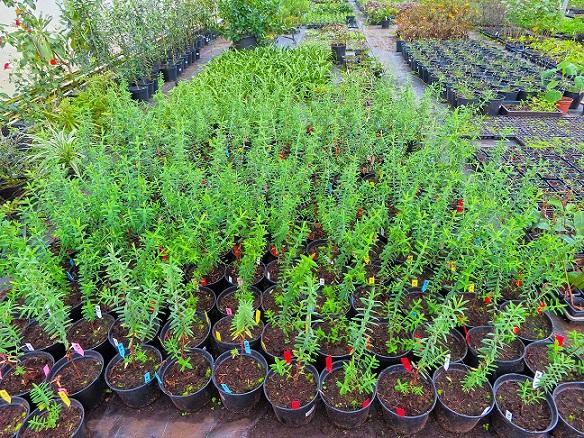- Home
- Worldwide
- CIRAD worldwide
- Projects
- BSV 2 project
Biodiversity and Plant Health – Diversity and genetic resources - BSV 2

Young plants of a species indigenous to Reunion Island © M. Naze, CIRAD
Issues
In order to further safeguard agriculture in Reunion Island in terms of production, as well as to enhance food safety in terms of the health quality of local products, genetic improvement of plant species is required to increase their resistance to disease. To achieve this, access to collections of crop genetic resources is needed in order to promote them with a view to diversifying agricultural production in Reunion Island. These collections also contribute to protecting Reunion’s agrobiodiversity by safeguarding indigenous species that are threatened with extinction due to human activities (habitat destruction and the introduction of invasive species).
Description
The project is built around six key actions:
- Development of the “Vatel” Biological Resources Centre, including the conservation, genetic characterisation and dissemination of vanilla plant varieties and the continuation of the quality process, ISO 9001 standard.
- Development of programmes for varietal selection/improvement and the sanitation of plant material (citrus, onion, maize, aubergine, vanilla, garlic, cassava).
- Production of stock plant material in order to produce foundation seed for varieties of aubergine, pepper, onion, maize and cucumber.
- Genetic control of bacterial wilt in solanaceous vegetables (aubergines, tomatoes, hot/sweet peppers)
- Genetic control of root and leaf rot in vanilla plants.
- Promotion of indigenous species in urban and peri-urban developments, restoration of degraded areas while preserving terrestrial biodiversity.
Expected changes
- The range of cultivated vegetables and plants integrating “forgotten plants” will increase.
- Methods for genetic control of the diseases studied will be available.
- New genetic and molecular tools will enable breeders to create resistant varieties suited to their production areas.
- Innovative programmes for urban and extra-urban landscaping will include indigenous plants thanks to methods based on sowing and implantation of priority indigenous species.
Expected impacts
The Vatel Biological Resources Centre will ensure the conservation of major species of interest for agrobiodiversity in the Indian Ocean, and will regularly acquire new plants of agronomic or horticultural interest.
- The profession will have a wide range of sanitised vegetable seeds.
- The main diseases of vanilla will be controlled.
- Plants grown in greenhouses will be naturally resistant to the main diseases encountered and these diseases will be well documented.
- Developers will have access to a wide range of well described endemic plants for the restoration of degraded habitats or for urban developments, but also to techniques enabling them to introduce these plants to areas that are difficult to reach. They will also have access to sufficient knowledge to maintain or even develop biodiversity wherever possible.
Partners
Local partners:
- ARMEFLHOR
- Flhorys seed company
- AROP FL through the cooperatives ARIFEL, VIVEA and SICA TR
- The PROVANILLE cooperative
- Professional and producers’ organisations
- Pépinière du Théâtre (plant nursery)
- Sapef Paysages for the hydroseeding trials
- Municipality of Tampon (environmental department, and plant nurseries)
National partners:
- Research units at CIRAD/INRAE and CNRS (I2BC in Paris)
- A university laboratory (IPS2 at Paris Sud University)
- The SouthGreen bioinformatics platform in Montpellier and the GeT-PlaGe sequencing platform in Toulouse
- Vanille de Tahiti (company)
International partners:
- University of Abidjan (Côte d’Ivoire),
- UNAM and University of Veracruz (Mexico),
- University of Copenhagen (Denmark)
- Technological Institute of Tuxtepec (Mexico)
Private partners:
- Syngenta, Vilmorin, Technisem/Nova Genetics, Enza Zaden, East West Seeds, and their local representatives, for the definition of selection criteria concerning the local market for varieties
- EuroVanille and MANE & Fils (France) as financiers of the project on genome sequencing of the vanilla plant Vanilla planifolia
























